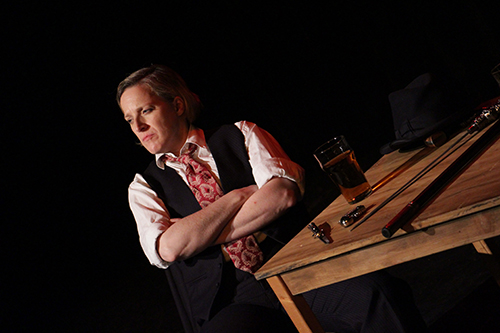
Alumnae Theatre Company cordially invites you to attend a family gathering at the home of Beverly and Violet Weston in Pawhuska, Oklahoma.
Alumnae opened its production of Tracy Letts’ August: Osage County on the mainstage last night. Directed by Victoria Shepherd and featuring a talented ensemble, this is family dysfunction at its grittiest, no holds barred best.
When the Weston family patriarch (Thomas Gough) goes missing, middle daughter Ivy (Andrea Lyons) – the only child who stayed in town – rallies the family around her ailing mother Violet (Marie Carriere Gleason). Violet’s sister Mattie Fae (Carol McLennan) and husband Charlie (Rob Candy) are the first to arrive, and we get a sense of the estrangement that underpins the family dynamic. The Weston’s oldest daughter Barbara (Kelly-Marie Murtha) is the most wanted – but least wanting – to be there; she arrives from Colorado with husband Bill (Paul Cotton) and 14-year-old daughter Jean (Melinda Jordan) in tow. Add to this mix youngest Weston girl Karen (Kathleen Jackson Allamby) and fiancé Steve (Chris Peterson), and cousin Little Charles (Neil Cameron), and the family circus is complete – occasionally witnessed from the outside by housekeeper/caregiver Johnna (Pearl Ho) and Sheriff Deon Gilbeau (Andrew Batten). The atmosphere becomes rife with nostalgia (for better or worse), secrets and schemes as things fall apart and come together only to fall apart again and again.
Nice work all around from this large, engaging cast. The play runs two and a half hours, plus intermission, but doesn’t feel like it. The Weston family women anchor this story – and the cast is particularly strong here. Gleason’s Violet is a complex puzzle of illness, addiction and survivor; quick to offer unsolicited – and decidedly not feminist – advice to the women in her life, her brutal honesty is shockingly unforgiving. Moments of manipulation and Hollywood-calibre drama queen can turn (seemingly) into flashes of genuine tenderness. Lyons gives a lovely, multi-layered performance as the put-upon Ivy; a character that could easily become a one-dimensional family doormat, she pushes back with a sharp wit and dark sense of humour. She has a pure heart and the patience of a saint, but as the main butt of her mother’s criticism, even she has her limits. Murtha’s Barbara is the picture of a woman on the edge, struggling with a complex set of emotions as her whole world is crumbling around her. The family rock, she strives to keep things together even as she’s falling apart herself – by turns angry, exasperated, protective and acerbically funny, putting out one fire as another appears. Allamby’s Karen is a beautiful contradiction; a high-energy chatterbox, Karen strives for self-awareness and adulthood, but comes off as flakey and deluded, with a poignant, child-like quality to her rose-coloured family nostalgia, born of selective memory. McLennan’s Mattie Fae, like her sister Violet, is a complex woman of contradiction – as cruel in her judgemental criticism (in her case, aimed at her son Little Charles) as she is fiercely protective of her family, including her son. And Jordan brings a precocious, wise child edge to Jean; a self-possessed young film buff coming into herself as she deals with her parents’ relationship issues.
Other stand-outs include Gough’s wry-witted, melancholy alcoholic Beverly; a lauded poet and academic at the end of his rope, we only see him at the top of the play, but his presence resonates and stays with us. Batten brings an understated, quiet and boyish bashfulness and sense of anticipation to the Sheriff, a former beau of Barbara’s. And Peterson’s Steve is both charming and skeevy; a smooth operator under that sweet, helpful exterior.
It’s like watching a train wreck – and you can’t look away. The high drama of this family gathering is tempered by sharp-edged, dark humour – which the family uses for both self-protection and sniper attacks – and occasional moments of genuine, loving connection. Nothing brings out a family’s true colours like tragedy.
With shouts to set designer Alexis Chubb’s minimalist, multi-level set, with its inventive and effective multiple playing areas and nooks for the various family vignettes. And to John Stuart Campbell for the sound design and original composition; his song “Can’t Run Far Enough” features vocals by Vivien Shepherd and Ron Smith on harmonica – and haunting, wistful western sounds.
Casual cruelty and family secrets abound in Alumnae’s ferociously funny, devastatingly poignant production of August: Osage County.
August: Osage County continues on the Alumnae mainstage until April 23; check here for ticket purchase/info. Performances include a pre-show chat with the design team at noon tomorrow (Sun, Apr 10); and a post-show talkback with the cast and crew on Sun, Apr 17.
Related trivia/info: Former Alumnae President (and damn fine actor) Dinah Watts is in a London Community Players’ production of August: Osage County in London, ON right now. Lett’s first play Killer Joe is in production at Coal Mine Theatre till April 24 (I’m seeing it on Tuesday). And founder/playwright at Cue6 Theatre Sarah Illiatovitch-Goldman (who was in Alumnae’s production of Wit, and has play We Three running now at Tarragon) is on the Steppenwolf Theater Company’s literary team for the world premiere of Letts’ play Mary Page Marlowe.
Oh yeah, and here’s the awesome trailer for the Alumnae production of August: Osage County (video by Nicholas Porteous):








Leave a reply to alumnaetheatre Cancel reply